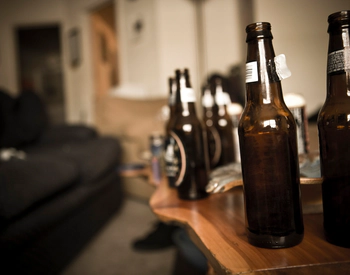Why You’re Not Yourself When You Drink, Part 2
Why is it that you’re not yourself when you drink? Part of it may be because alcohol reduces one’s ability to control themselves and make good decisions.

Researchers have shown a direct relationship between alcohol and disadvantageous decision-making. Critically, as alcohol consumption increases by volume and frequency, good decisions decline, and harmful decisions increase.
Decision-Making and Binge Drinking
In 2009, a group of researchers published a paper in Alcoholism: Clinical and Experimental Research that found a compelling link between excessive alcohol consumption and disadvantageous decisions, specifically regarding young adults. The researchers analyzed behavioral patterns and day-to-day decisions of several groups of young adults, including those who drank to excess and those who did not.1
The group that drank excessively made less advantageous choices than the group that either did not drink often or did not drink at all. The findings also showed that the younger one was when they began drinking excessively, the more likely they were to make poor decisions and exhibit poor judgment.
It’s More Than One Study
The researchers cited in the previous section were just some of the first who published hard data connecting alcohol to decision-making and judgment. More recently, other scientists have produced findings that show similar results.
In a 2022 paper published in Neuropsychopharmacology, study authors showed a relationship between alcohol consumption and shifts in the drinkers’ decisions concerning moral judgment and altruistic behavior. According to the researchers, “…alcohol at low to moderate doses selectively moderates decision making in the social domain, and promotes utilitarian decisions over those dictated by rule-based ethical principles.” The researchers posited that the more one drank, the more likely their decision-making and judgment would shift away from rules-based and ethical decisions.2
Another paper, this one published in 2020 by researchers at the University of Bath, found that people who drink experience a drop in their decision-making and judgment even after drinking, particularly in the 24 hours following intoxication.3
“We know that hangovers can have a big economic cost, but we did not know how hangover affects our ability to switch attention from one task to another, update information in our mind, and maintain focus on set goals…”
In that study, individuals were assessed for their ability to switch attention between day-to-day tasks, update and process information from multiple sources simultaneously, and guide and plan behavior while experiencing a hangover. According to the research, the individuals in the study who were hungover had a reduced ability to retain information. They were impaired when switching their attention from one task to the next, making a decision, and focusing on a goal. Lead author Craig Gunn of Bath’s Department of Psychology commented on how important it was that people understand how alcohol affects many aspects of thinking and decision-making. “We know that hangovers can have a big economic cost, but we did not know how hangover affects our ability to switch attention from one task to another, update information in our mind, and maintain focus on set goals,” said Gunn. “Our study asked participants to complete tasks measuring these processes when they had a hangover and again when they had not consumed alcohol. The results suggest that all of these processes are impaired by a hangover, which could have consequences for other aspects of our lives.” The authors highlighted that their findings came at a time when the U.K. was recording an estimated 8.6 million adults drinking more frequently during the Covid-19 pandemic.
Alcohol and the Human Body
The National Institute on Alcohol Abuse and Alcoholism reports alcohol affects multiple areas of the human body. Further, there is no “safe” amount of alcohol one can consume, as any amount has a deleterious effect and should be avoided. Some of the areas of one’s physical health that are affected by alcohol include:4
- Cardiac health. Problems include cardiac arrhythmias, cardiomyopathy, ischemia, heart disease, and hypertension.
- Neurological health. Problems include ischemic stroke and hemorrhagic stroke.
- Oral cavity health. Problems include esophageal cancer and oral cavity cancer.
- Lung health. Problems include acute respiratory distress syndrome and pneumonia.
- Liver health. Problems include steatosis, steatohepatitis, fibrosis, cirrhosis, alcohol-associated hepatitis, and liver cancer.
- Muscle health. Problems include myopathy and muscle wasting.
- Gastrointestinal health. Problems include gut leaking, microbial dysbiosis, and colorectal cancer.
- Pancreas health. Problems include acute pancreatitis and chronic pancreatitis.
- Bone health. Problems include impaired fracture repair and reduced bone density.
Alcohol is also a known carcinogen responsible for about 4% of cancer deaths annually. Some of the cancers connected to alcohol include cancers of the:
- Head
- Neck
- Oral cavity
- Liver
- Breast
- Colon
Drinking too much alcohol also weakens the immune system. Just as one will experience difficulty making good decisions and exhibiting judgment during alcohol intoxication and in the following hours, data suggests one’s immune response is hampered for up to 24 hours after drinking.
The Scope of Alcohol Abuse in the U.S. Today and the Need for Treatment

According to the NIAAA, about 213 million U.S. adults and 4.6 million adolescents drink alcohol regularly. Approximately 140,000 people die from alcohol-related causes yearly, a 25% increase from 2019. Alcohol-related emergencies currently lead to about 210,000 emergency department visits yearly, an uptick from previous years.5
Some people can drink alcohol without becoming addicted to it. However, alcohol is harmful to one’s physical and mental health and therefore should be avoided. Further, some people cannot control their drinking. They find themselves drinking more alcohol, more often. These individuals are at particularly high risk of experiencing alcohol-related harm.
If you know someone who drinks alcohol and can’t stop consuming it on their own, please get in touch with a qualified, residential alcohol addiction treatment center as soon as possible. There is a way out for those suffering from alcohol addiction, but finding that way out requires professional help. Please don’t wait until it is too late.
Sources Cited:
-
ACER. “Decision Making and Binge Drinking: A Longitudinal Study.” Alcoholism: Clinical and Experimental Research, 2007. onlinelibrary.wiley.com ↩︎
-
Neuropsychopharmacology. “Acute effects of alcohol on social and personal decision making.” Neuropsychopharmacology, 2022. nature.com ↩︎
-
ScienceDaily. “Heavy cost of excessive drinking on people’s decision making.” Science Daily, 2020. sciencedaily.com ↩︎
-
NIAAA. “Alcohol’s Effects on the Body.” National Institute on Alcohol Abuse and Alcoholism, 2023. niaaa.nih.gov ↩︎
-
NIAAA. “Alcohol’s Effects on Health.” National Institute on Alcohol Abuse and Alcoholism, 2023. niaaa.nih.gov ↩︎




 ®
®